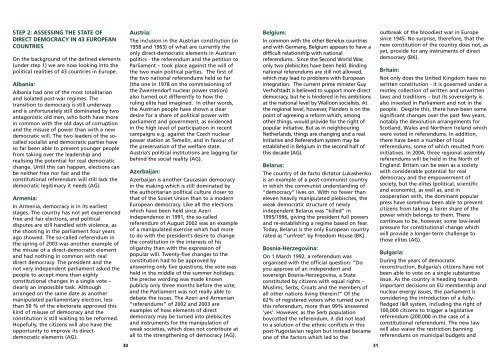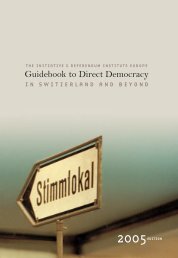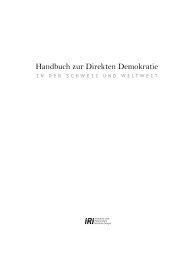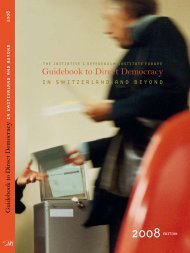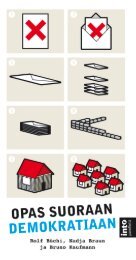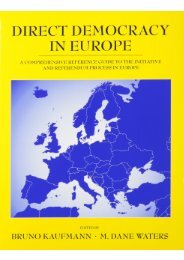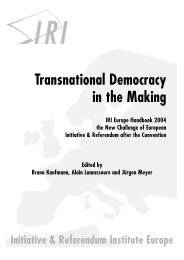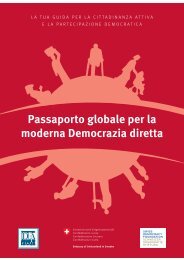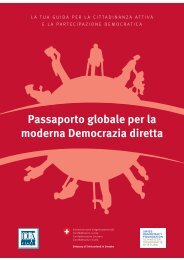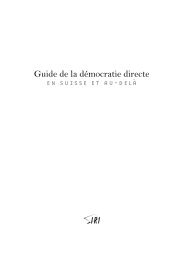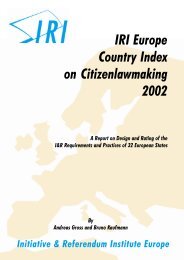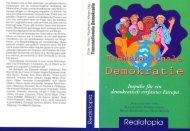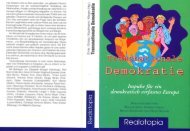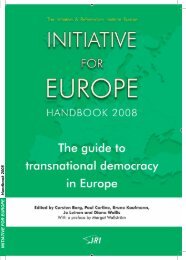Initiative & Referendum Monitor 2004/2005
The IRI Europe Toolkit for Free and Fair Referendums and Citizens’ Initiatives
The IRI Europe Toolkit for Free and Fair Referendums and Citizens’ Initiatives
You also want an ePaper? Increase the reach of your titles
YUMPU automatically turns print PDFs into web optimized ePapers that Google loves.
STEP 2: ASSESSING THE STATE OF<br />
DIRECT DEMOCRACY IN 43 EUROPEAN<br />
COUNTRIES<br />
On the background of the defined elements<br />
(under step 1) we are now looking into the<br />
political realities of 43 countries in Europe.<br />
Albania:<br />
Albania had one of the most totalitarian<br />
and isolated post-war regimes. The<br />
transition to democracy is still underway<br />
and is unfortunately still dominated by two<br />
antagonistic old men, who both have more<br />
in common with the old days of corruption<br />
and the misuse of power than with a new<br />
democratic will. The two leaders of the socalled<br />
socialist and democratic parties have<br />
so far been able to prevent younger people<br />
from taking over the leadership and<br />
realising the potential for real democratic<br />
change. Until this can happen, elections can<br />
be neither free nor fair and the<br />
constitutional referendum will still lack the<br />
democratic legitimacy it needs (AG).<br />
Armenia:<br />
In Armenia, democracy is in its earliest<br />
stages. The country has not yet experienced<br />
free and fair elections, and political<br />
disputes are still handled with violence, as<br />
the shooting in the parliament four years<br />
ago showed. The so-called referendum in<br />
the spring of 2003 was another example of<br />
the misuse of a direct-democratic element<br />
and had nothing in common with real<br />
direct democracy. The president and the<br />
not very independent parliament asked the<br />
people to accept more than eighty<br />
constitutional changes in a single vote –<br />
clearly an impossible task. Although<br />
arranged on the same date as another<br />
manipulated parliamentary election, less<br />
than 50 % of the electorate approved this<br />
kind of misuse of democracy and the<br />
constitution is still waiting to be reformed.<br />
Hopefully, the citizens will also have the<br />
opportunity to improve its directdemocratic<br />
elements (AG).<br />
30<br />
Austria:<br />
The inclusion in the Austrian constitution (in<br />
1958 and 1963) of what are currently the<br />
only direct-democratic elements in Austrian<br />
politics - the referendum and the petition to<br />
Parliament – took place against the will of<br />
the two main political parties. The first of<br />
the two national referendums held so far<br />
(the one in 1978 on the commissioning of<br />
the Zwentendorf nuclear power station)<br />
also turned out differently to how the<br />
ruling elite had imagined. In other words,<br />
the Austrian people have shown a clear<br />
desire for a share of political power with<br />
parliament and government, as evidenced<br />
in the high level of participation in recent<br />
campaigns e.g. against the Czech nuclear<br />
power station at Temelin, and in favour of<br />
the preservation of the welfare state.<br />
Austria’s political institutions are lagging far<br />
behind the social reality (AG).<br />
Azerbaijan:<br />
Azerbaijan is another Caucasian democracy<br />
in the making which is still dominated by<br />
the authoritarian political culture closer to<br />
that of the Soviet Union than to a modern<br />
European democracy. Like all the elections<br />
which have been held since Azeri<br />
independence in 1991, the so-called<br />
referendum of August 2002 was an example<br />
of a manipulated exercise which had more<br />
to do with the president’s desire to change<br />
the constitution in the interests of his<br />
oligarchy than with the expression of<br />
popular will. Twenty-five changes to the<br />
constitution had to be approved by<br />
answering only five questions; the vote was<br />
held in the middle of the summer holidays;<br />
the precise wording was made known<br />
publicly only three months before the vote;<br />
and the Parliament was not really able to<br />
debate the issues. The Azeri and Armenian<br />
“referendums” of 2002 and 2003 are<br />
examples of how elements of direct<br />
democracy may be turned into plebiscites<br />
and instruments for the manipulation of<br />
weak societies, which does not contribute at<br />
all to the strengthening of democracy (AG).<br />
Belgium:<br />
In common with the other Benelux countries<br />
and with Germany, Belgium appears to have a<br />
difficult relationship with national<br />
referendums. Since the Second World War,<br />
only two plebiscites have been held. Binding<br />
national referendums are still not allowed,<br />
which may lead to problems with European<br />
integration. The current prime minister Guy<br />
Verhofstadt is believed to support more direct<br />
democracy, but he is hindered in his ambitions<br />
at the national level by Walloon socialists. At<br />
the regional level, however, Flanders is on the<br />
point of agreeing a reform which, among<br />
other things, would provide for the right of<br />
popular initiative. But as in neighbouring<br />
Netherlands, things are changing and a real<br />
<strong>Initiative</strong> and <strong>Referendum</strong> system may be<br />
established in Belgium in the second half of<br />
this decade (AG).<br />
Belarus:<br />
The country of de facto dictator Lukashenko<br />
is an example of a post-communist country<br />
in which the communist understanding of<br />
“democracy” lives on. With no fewer than<br />
eleven heavily manipulated plebiscites, the<br />
weak democratic structure of newly<br />
independent Belarus was “killed” in<br />
1995/1996, giving the president full powers<br />
and re-establishing a regime based on fear.<br />
Today, Belarus is the only European country<br />
rated as “unfree” by Freedom House (BK).<br />
Bosnia-Herzegovina:<br />
On 1 March 1992, a referendum was<br />
organised with the official question: “Do<br />
you approve of an independent and<br />
sovereign Bosnia-Herzegovina, a State<br />
constituted by citizens with equal rights –<br />
Muslims, Serbs, Croats and the members of<br />
all other nations living therein?” Of the<br />
62% of registered voters who turned out in<br />
this referendum, more than 99% answered<br />
‘yes’. However, as the Serb population<br />
boycotted the referendum, it did not lead<br />
to a solution of the ethnic conflicts in this<br />
post-Yugoslavian region but instead became<br />
one of the factors which led to the<br />
31<br />
outbreak of the bloodiest war in Europe<br />
since 1945. No surprise, therefore, that the<br />
new constitution of the country does not, as<br />
yet, provide for any instruments of direct<br />
democracy (BK).<br />
Britain:<br />
Not only does the United Kingdom have no<br />
written constitution - it is governed under a<br />
motley collection of written and unwritten<br />
laws and traditions – but its sovereignty is<br />
also invested in Parliament and not in the<br />
people. Despite this, there have been some<br />
significant changes over the past few years,<br />
notably the devolution arrangements for<br />
Scotland, Wales and Northern Ireland which<br />
were voted in referendums. In addition,<br />
there have been a number of local<br />
referendums, some of which resulted from<br />
initiatives. In <strong>2004</strong>, three regional assembly<br />
referendums will be held in the North of<br />
England. Britain can be seen as a society<br />
with considerable potential for real<br />
democracy and the empowerment of<br />
society, but the elites (political, scientific<br />
and economic), as well as, and in<br />
cooperation with, the dominant popular<br />
press have somehow been able to prevent<br />
citizens from taking a fairer share of the<br />
power which belongs to them. There<br />
continues to be, however, some low-level<br />
pressure for constitutional change which<br />
will provide a longer-term challenge to<br />
those elites (AG).<br />
Bulgaria:<br />
During the years of democratic<br />
reconstruction, Bulgaria's citizens have not<br />
been able to vote on a single substantive<br />
issue. As the country is heading towards<br />
important decisions on EU membership and<br />
nuclear energy issues, the parliament is<br />
considering the introduction of a fullyfledged<br />
I&R system, including the right of<br />
100,000 citizens to trigger a legislative<br />
referendum (200,000 in the case of a<br />
constitutional referendum). The new law<br />
will also waive the restriction banning<br />
referendums on municipal budgets and


